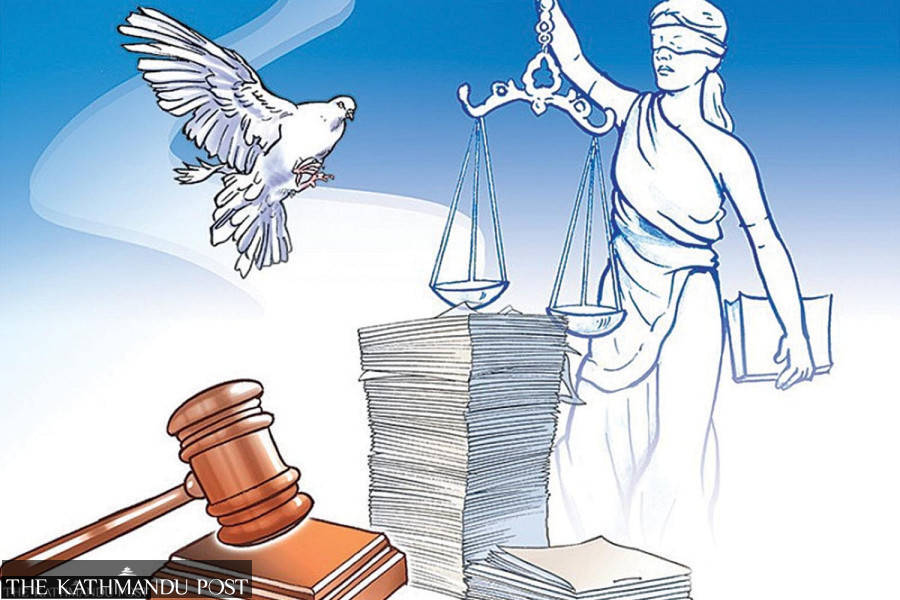National
International lawyers’ delegation calls for appointing experts to lead Nepal’s transitional justice bodies
They said this in a report prepared based on interactions with multiple stakeholders including conflict victims and civil society organisations.
Post Report
As the search committee starts to select office-bearers in the two transitional justice commissions, a report by an independent delegation of international lawyers says the appointee must have proven expertise in peace-building and victim-centred justice.
The report on the state of Nepal’s transitional justice process prepared by a six-member team of lawyers from different nations says the commission’s chairpersons and members should also reflect the country's gender, ethnic, and regional makeup. This principle also applies to the selection of judges for the Special Court that will be constituted to hear war-era cases of human rights violations.
“The delegation noted that the level of executive influence over its appointment inevitably raises questions about the independence of the appointees; both as to its perceived and actual independence. The integrity of the process is key. This should be addressed in the context of transitional justice, and current proposed constitutional amendments," reads the report released Thursday.
Kishali Pinto-Jayawardena from Sri Lanka, Aswini Weereratne from the United Kingdom, María del Rosario Arango Zambrano from Colombia, Haydée Dijkstal, barrister in the USA and the Netherlands, Bruno Menzan, from Côte d’Ivoire Camila Zapata Besso, barrister in the UK and Colombia, prepared the report after they visited Nepal from March 12 to 18.
The report was prepared based on interactions with conflict victims, civil society organisations, elected national and local government representatives, state authorities, members of the judiciary, human rights lawyers and defenders, journalists, the diplomatic community, and UN representatives in Nepal.
The search committee that was restructured by Prime Minister KP Sharma Oli last week has started the process to select the chairpersons and members of the Truth and Reconciliation Commission (TRC) and the Commission of Investigation on Enforced Disappeared Persons (CIEDP). Its two-month term has already started from Sunday.
The delegation found that, despite the urgent need for victims to receive justice, the broad support of state actors across the political spectrum, and keen encouragement from domestic civil society organisations and the international community, the state has as yet been unable to effectively implement a transitional justice process in line with international standards, according to the report.
"Ensure that the institutions at the heart of the transitional justice process, and the processes for their appointment, are not tainted by a lack of independence or impartiality, or a perception of the same,” reads the report. “Judges and commissioners should be individuals with proven expertise in peace-building and victim-centred justice, and should be reflective of the gender, ethnic and regional makeup of the country.”
It has stressed that the office-bearers should be selected through a transparent and public selection process, free from interference by political parties.
The delegation had recommended the government to ensure that the TRC and CIEDP are given the funding, investigative capacity, infrastructure, technical knowledge, expertise and strategy necessary to conduct evidence-collecting for the purposes of safely investigating cases, where the remains of disappeared persons are, who is responsible, and recommending prosecutions.
Stating that the three judges would be overburdened to look after the cases the two commissions recommend, the lawyers team has suggested increasing their numbers.
The delegation has raised concerns over the protection of the evidence of the human rights violation from the insurgency.
"Remove the conflict-era archives of the national security forces from the forces’ and the governments’ control. Ensure governmental and civil society archives are independently safeguarded, for the access and investigation of transitional justice investigative bodies,” the report recommends. “Develop mechanisms for the independent safeguarding of conflict-related data generally, including that emanating from the state, the TRC, CIEDP and National Human Rights Commission, civil society and victims’ groups. Provide for the suspension from public office of any person against whom a prosecution is filed, until the case is determined."




 18.12°C Kathmandu
18.12°C Kathmandu













